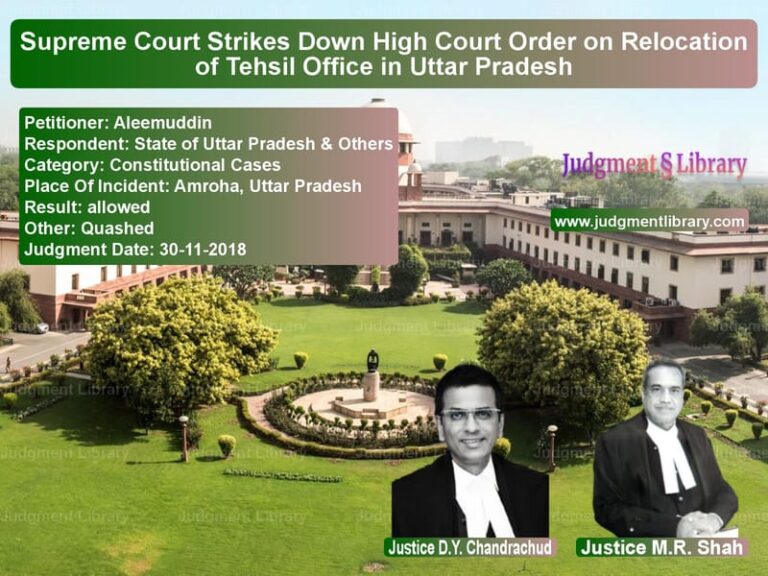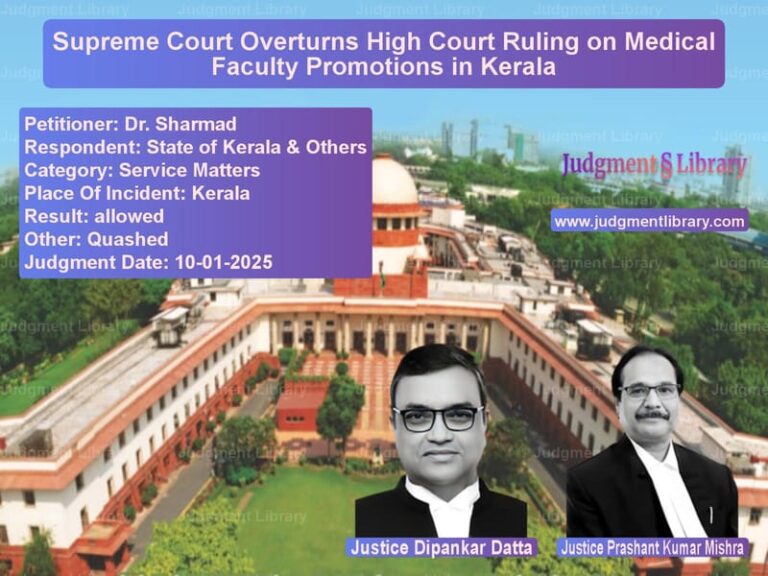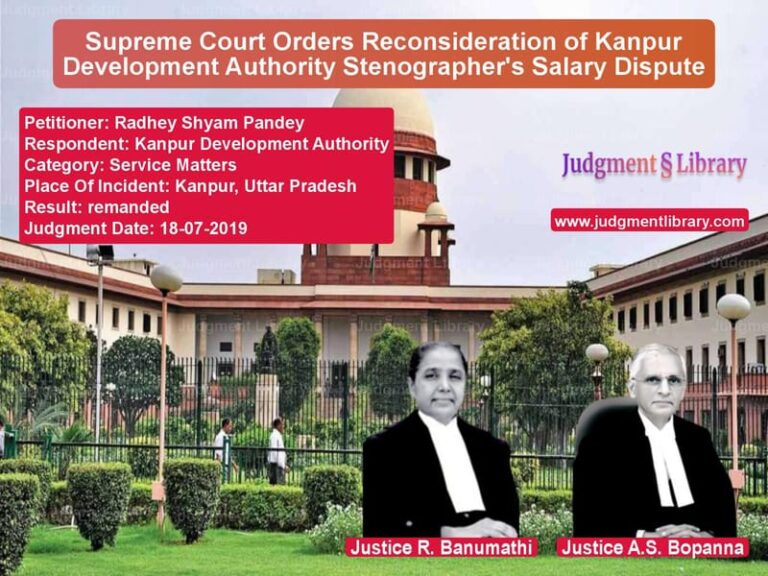Delhi Rent Control Act: Supreme Court Rules on Res Judicata in Eviction Proceedings
The case of Prem Kishore & Ors. vs. Brahm Prakash & Ors. is a significant ruling concerning landlord-tenant disputes under the Delhi Rent Control Act, 1958. The Supreme Court addressed whether a second eviction petition could be barred under the principle of res judicata when an earlier eviction petition had been dismissed due to the failure of the landlord to establish a landlord-tenant relationship.
Background of the Case
The dispute revolves around a property located at House No. 163 (Old No. 143), Village Dhakka, Kingsway Camp, Delhi. The respondents were inducted as tenants in 1987 by the father of the appellants on a monthly rent of ₹1050, excluding electricity, water, and house tax.
The sequence of events leading to the dispute:
- 1993: The tenants stopped paying rent.
- 1996: The landlord (father of the appellants) served a demand notice for arrears amounting to ₹27,800, which remained unpaid.
- May 21, 1996: The landlord filed Eviction Petition No. 149 of 1996 under Section 14(1)(a) of the Delhi Rent Control Act.
- January 27, 1998: The Rent Controller dismissed the eviction petition after the landlord failed to establish the landlord-tenant relationship.
- 2001: After the original landlord passed away, the appellants (his legal heirs) filed a fresh eviction petition (Eviction Petition No. 136 of 2001) against the respondents for non-payment of rent.
- 2002: The respondents filed an application under Order 7 Rule 11 of the Code of Civil Procedure (CPC), arguing that the new petition was barred by res judicata.
- July 23, 2002: The Additional Rent Controller rejected the respondents’ plea, allowing the eviction petition to proceed.
- 2010: The Delhi High Court overturned this order and rejected the eviction petition under the principle of res judicata.
- March 29, 2023: The Supreme Court overturned the High Court’s decision and reinstated the eviction petition.
Arguments by the Appellants (Landlords)
The appellants challenged the High Court’s decision on the following grounds:
- The High Court erred in applying res judicata, as the first eviction petition was dismissed due to lack of evidence, not on merits.
- The fresh eviction petition was based on a separate cause of action—continued non-payment of rent from 1993 to 2001.
- The rejection of the first eviction petition was procedural, not substantive, and did not conclusively determine the landlord-tenant relationship.
Arguments by the Respondents (Tenants)
The tenants defended the High Court’s ruling, asserting that:
- The first eviction petition was dismissed because the landlord failed to establish the landlord-tenant relationship, making the second petition legally untenable.
- The second eviction petition sought to relitigate the same issue and was therefore barred by res judicata.
- The petitioners were attempting to indirectly achieve what they failed to do in the first eviction petition.
Supreme Court’s Judgment
The Supreme Court overturned the High Court’s decision, ruling in favor of the appellants. The key findings were:
1. The First Eviction Petition Was Not Decided on Merits
The Court emphasized that the 1998 dismissal of the eviction petition was procedural due to the landlord’s failure to lead evidence. The judgment noted:
“The failure to adduce evidence, resulting in dismissal of the claim, is in reality not a decision on merits. If the landlord had produced evidence and the court had considered it inadequate, then the dismissal could have been treated as a conclusive decision.”
2. Res Judicata Does Not Apply to a Procedural Dismissal
The Court ruled that a dismissal for failure to prosecute does not bar a fresh suit on the same subject matter:
“Where a suit is dismissed due to procedural default, such a decision does not prevent the plaintiff from filing a new suit on the same subject matter, provided it is based on a fresh cause of action.”
3. Fresh Cause of Action Due to Continued Non-Payment of Rent
The Court observed that the arrears claimed in the second eviction petition were for a different period (1993-2001) than those in the first petition. Therefore, the second petition was not barred:
“The claim in the second eviction petition is for a different period of rent arrears. The cause of action is fresh, and therefore, res judicata does not apply.”
4. High Court’s Error in Applying Order 7 Rule 11 CPC
The Supreme Court ruled that the High Court had wrongly applied Order 7 Rule 11(d) of CPC:
“Order 7 Rule 11 can only be applied when a suit is barred by law on the face of it. The plea of res judicata requires evidence and cannot be decided solely on the basis of pleadings.”
Final Ruling
The Supreme Court:
- Allowed the appeal and set aside the High Court’s decision.
- Reinstated the eviction petition, allowing it to proceed on merits.
- Directed the Rent Controller to hear the case afresh.
Conclusion
This ruling clarifies the application of res judicata in eviction cases under the Delhi Rent Control Act. It ensures that procedural dismissals do not prevent landlords from seeking eviction on fresh causes of action, such as continued non-payment of rent. By reinstating the eviction petition, the Supreme Court has reaffirmed that procedural defaults should not unduly restrict access to justice.
Petitioner Name: Prem Kishore & Ors..Respondent Name: Brahm Prakash & Ors..Judgment By: Justice Sudhanshu Dhulia, Justice J.B. Pardiwala.Place Of Incident: Delhi.Judgment Date: 29-03-2023.
Don’t miss out on the full details! Download the complete judgment in PDF format below and gain valuable insights instantly!
Download Judgment: prem-kishore-&-ors.-vs-brahm-prakash-&-ors.-supreme-court-of-india-judgment-dated-29-03-2023.pdf
Directly Download Judgment: Directly download this Judgment
See all petitions in Property Disputes
See all petitions in Landlord-Tenant Disputes
See all petitions in Contract Disputes
See all petitions in Specific Performance
See all petitions in Damages and Compensation
See all petitions in Judgment by Sudhanshu Dhulia
See all petitions in Judgment by J.B. Pardiwala
See all petitions in allowed
See all petitions in Remanded
See all petitions in supreme court of India judgments March 2023
See all petitions in 2023 judgments
See all posts in Civil Cases Category
See all allowed petitions in Civil Cases Category
See all Dismissed petitions in Civil Cases Category
See all partially allowed petitions in Civil Cases Category







